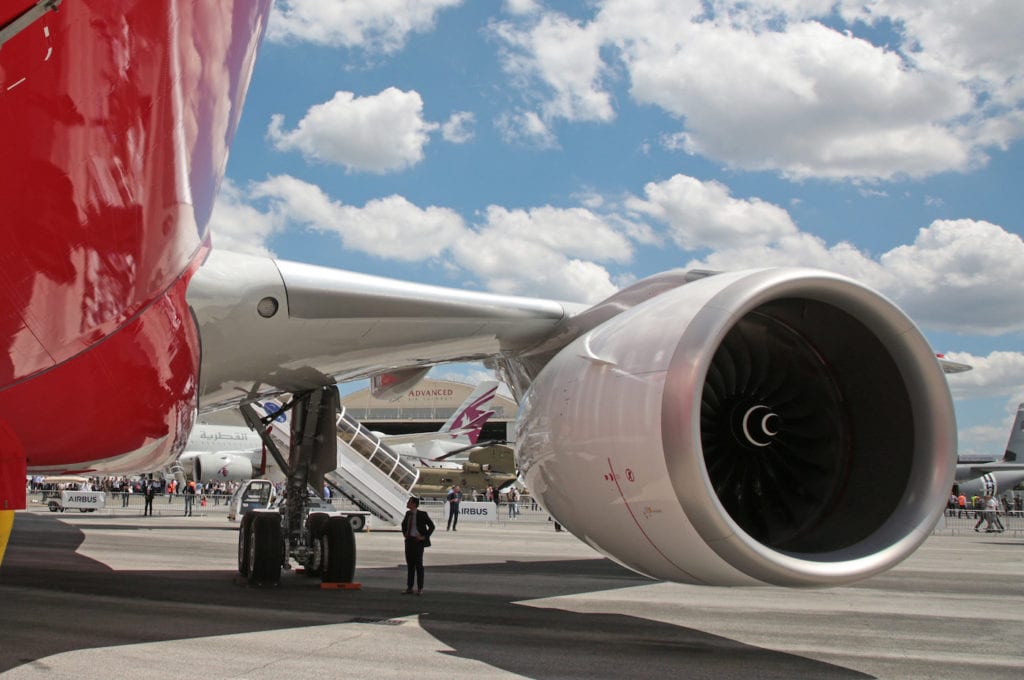
Rolls Royce, whose Trent 7000 engine is pictured here on an AirAsia A330neo, is the launch customer for SITAONAIR’s new e-Aircraft DataHub ‘data brokerage’ service technology. Photo: Rolls Royce
As the industry continually shifts toward the use of data-intensive predictive maintenance-based flight operations, a new cloud-based aircraft data-brokering platform, e-Aircraft DataHub, is what SITAONAIR hopes can resolve the ongoing question airlines and original equipment manufacturers have yet to resolve about who owns the data.
Rolls Royce is the e-Aircraft DataHub launch customer, and several airlines are performing flight trials with the technology right now, Pierre-Yves Benain, portfolio head for SITAONAIR’s e-Aircraft division told Avionics International. The data-brokering service enables airlines to share only the aircraft data they have selected, derived from engines or other components and systems, with their chosen manufacturer or supplier.
It relies upon two key technologies, including SITAONAIR’s existing Aircraft Communication, Addressing and Reporting System (ACARS) network and onboard avionics. The other data-brokering enabler is Cassiopee Node, a parallel computation engine developed by Safran that is capable of decoding, analyzing, cleansing and sorting large volumes of flight data prior to distributing them to the appropriate source, according to Benain.

An overview of how DataHub works. Photo: SITAONAIR
“The solution functions by first automatically collecting an airline’s authorized raw data, before classifying, decoding, storing and distributing structured data sets to its specified partner. By connecting to airline ground servers to identify and upload relevant, approved aircraft data files and ACARS messages, e-Aircraft DataHub then sorts, filters, classifies, decodes and distributes the data, under that airline’s control,” Benain said.
Once a file is made available to DataHub by the airline it is transferred immediately to DataHub for processing and decoding by the Cassiopée Node, prior to being distributed to the airline’s chosen manufacturer or maintenance and repair organization, according to Benain. Under this data-brokerage structure, airlines have a recovery point to refer to in the event of failure on behalf of the digital service provider and can also switch providers with an easier data migration process.
 | Want to hear more on aircraft connectivity applications? Check out the Global Connected Aircraft Podcast, where Avionics editor-in-chief Woodrow Bellamy III interviews airlines and industry influencers on how they’re applying connectivity solutions. |
Benain said the enablement of DataHub on aircraft does not require any new avionics installations or upgrades on aircraft to work. The cloud-based technology can process ACARS flight operation quality assurance data, such as quick access or smart access recorder data formats, along with manufacturer-specific data files.
“This is a powerful data solution, enabling us to work with valued airline customers to navigate and extract greater value from aircraft data, in a trusted way, to help improve aircraft availability and minimize operational costs,” said Nick Ward, head of product management, servitization and user experience at Rolls Royce, of the new technology.
According to Benain, SITAONAIR currently has “a number of airlines in trial mode” and will communicate more information about its adoption as carriers progress through those trials.